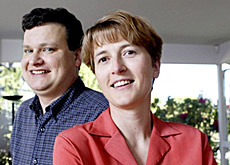Universities hunt for academic inspiration abroad

Switzerland’s universities are continuing to headhunt large numbers of professors from abroad.
Their latest coup has been the hiring of one of the world’s top environmental scientists, Marc Parlange, who has been working in the United States.
Lausanne’s Federal Institute of Technology announced this month that Parlange would be joining its Architecture, Civil and Environmental Engineering department.
Parlange, who has been lured away from the prestigious Johns Hopkins University in Baltimore, is considered to be one of the leading researchers in the field of environmental engineering.
Stephan Catsicas, vice-president for research at the Lausanne institute, insists it is not a question of ignoring local talent, simply a desire to attract the best people no matter where they come from.
“We don’t have a policy to hire foreign professors,” he said. “Our clear policy is to hire the best possible people when we have an opening, regardless of their nationality.”
Foreign academics
Switzerland has traditionally attracted foreign academics, especially from Germany and France.
Around 40 per cent of full professors are foreigners, but numbers vary substantially from one institution to another.
Only one in eight professors at Neuchâtel University comes from abroad, whereas nearly two-thirds of the tenured faculty at the University of Lugano are foreign.
“Foreign academics find Switzerland attractive because of our comparatively high salaries for professors and the nice environment,” said Xavier Comtesse of the Avenir Suisse think tank.
The starting salary for a full professor at one of the country’s two Federal Institutes of Technology is estimated to be nearly SFr200,000 ($155,000) a year.
In the US, public universities pay on average $113,000 (SFr147,000) for a full professor, while private institutions are prepared to pay more (over $140,000 at Harvard).
Headhunting
Competition to net the best researchers is fierce, and Switzerland’s universities actively headhunt, especially in the field of science.
“Most top researchers don’t even think of moving until you ask them the question,” Catsicas told swissinfo.
But salaries, however attractive, are just one factor when it comes to trying to attract star scientists. Funding is also an issue when competing against other international institutions, especially in the United States.
Catsicas admits that in some disciplines funding is limited and that there is far more money available in countries like the United States.
But he says the situation has begun to improve, thanks to scientific cooperation accords with the European Union.
“What we can guarantee is long-term internal funding,” added Catsicas. “In the United States, funding often comes from outside the university and restrictions apply to its use.”
“With the basic budget we offer, professors are really free to take the risks they want. The fact that you are not expected to supply immediate results is something that is very attractive even for the best people.”
Local talent
Catsicas is the first to acknowledge that chasing the best scientists abroad is not an option for all Swiss universities.
“It is easier for us to look abroad because we deal with science and technology,” he said. “But if we are talking about humanities, for example, the rules are different.”
Avenir Suisse, which has called for sweeping reforms of the university system, tends to agree with this vision.
“For some courses, such as social sciences and law, local faculty have far more to offer to students in terms of their future careers,” said Comtesse.
Swiss universities have also been slow to react to the much talked-about tenure-track system. Many institutions are still struggling with the concept, which promotes young talent and offers them a possible career path.
With little opportunity for researchers to access tenured positions until much later, homegrown academics are turning their backs on Switzerland or abandoning research altogether.
Some schools like Lausanne’s Institute of Technology have begun to offer assistant and associate professor positions to promising young researchers.
Around ten per cent of its faculty is already part of this programme, with the long-term aim of raising this figure to 40 per cent.
swissinfo, Scott Capper
Around 40 per cent of full professors at Swiss universities are foreigners, according to 2002 statistics.
Salaries for full professors are not published as a rule, but it is estimated that a starting salary for a full professor at one of the two Federal Institutes of Technology (Lausanne and Zurich) is close to SFr200,000.
In the US, public universities pay on average $113,000 (SFr147,000) for a full professor, while private institutions are prepared to pay more (over $140,000 at Harvard).
Earlier this month the US National Academies of Sciences said it feared it would no longer be able to attract the best scientists and engineers from around the world because of tougher visa restrictions.
“Our visa processing system not only must provide genuine security against those who might do us harm, but also keep our borders open to the stream of scientific and technical talent that fuels our progress,” it said.

In compliance with the JTI standards
More: SWI swissinfo.ch certified by the Journalism Trust Initiative


You can find an overview of ongoing debates with our journalists here . Please join us!
If you want to start a conversation about a topic raised in this article or want to report factual errors, email us at english@swissinfo.ch.